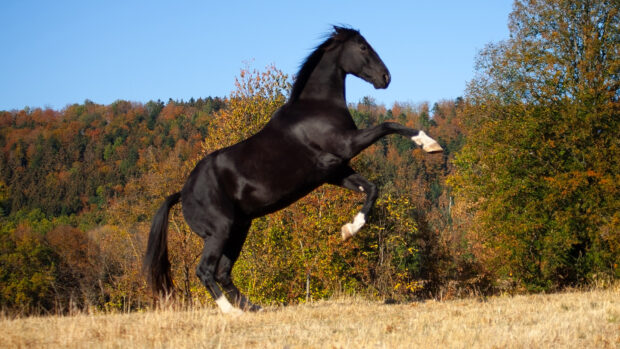Many early pregnancy losses in horses could be caused by chromosome defects, a new pioneering study has shown.
Researchers from the Royal Veterinary College (RVC), as part of a team from Cornell University, analysed 256 samples from mares to understand how abnormalities in chromosomes affect early pregnancy loss. The study found that having three sets of a certain type of chromosome, as opposed to the two in a healthy foetus, was the most common chromosomal abnormality that contributed to pregnancy loss.
Other irregularities included the presence of one extra chromosome, and one fewer, which accounted for 12% of losses. The researchers said the findings mean it is possible to account for potential causes in 60–70% of early pregnancy loss, up from 20–30%.
Lead researcher Mandi de Mestre, a professor in equine medicine at the Cornell University College of Veterinary Medicine, told H&H this work builds on previous knowledge in this area – and although it is not known yet what causes chromosome abnormalities, the work shows they are “incredibly common”.
“Miscarriage is really emotional; obviously you have lost that potential for life that people are desperate to reproduce from their mare, but the other frustrating thing is not being able to explain why it occurred,” said Professor de Mestre, adding that the research looked at naturally covered mares, and further studies would be needed to look at pregnancies occurring from IVF.
“The main take-home is that we are now starting to know that it could be the first thing to think of when your mare loses a pregnancy, at least in those first two months. We clearly have a lot of work to do on how we can prevent it, how we can develop treatments, or make mating choices that reduce the chance of it happening.
“Given how common it is, I don’t think we’re likely to wipe it out, but you might change how you go about treatment for that mare in the knowledge that this is a really common thing to look out for.”
RVC research fellow Jessica Lawson added that in addition to the “significant findings”, the team “for the first time, has identified sub-chromosomal aberrations in an aborted foetus and a stillborn foal”.
“These aberrations likely constitute a rare but important cause of later-term pregnancy loss, and we look forward to continuing to investigate the clinical significance of these genomic changes,” said Dr Lawson.
The researchers also said that although chromosomal abnormalities are widely acknowledged as a common cause of human miscarriage, owing to the similarities between human and equine chromosome structures and other pregnancy characteristics, this study supports the use of horses as a “novel model organism to study miscarriage in women”.
“In women, you see these genetic conditions as a common cause of miscarriage, but we often don’t get these really early samples. Because we scan horses regularly and monitor them so closely, we were able to look at an even earlier period than they routinely look at in women,” said Prof de Mestre.
The Thoroughbred Breeders’ Association contributed funds, data and case material to the research, and the association’s veterinary committee chair James Crowhurst told H&H the results “proved highly informative” and are “exciting in terms of broadening understanding in this area”.
“As conception rates in horses have greatly improved over the last 40 years, in no small part due to pioneering work by Professor William ‘Twink’ Allen and his team, plus others, attention was then drawn to exploring the causative factors of pregnancy loss,” said Dr Crowhurst.
“Simultaneous advances in genetic analysis have allowed Prof Mandi de Mestre and Dr Jessica Lawson to investigate genetic causes of early embryonic failure, leading to these pioneering studies.”
- Read the research paper.
- To stay up to date with all the breaking news throughout the Paralympic Games, Burghley, Horse of the Year Show and more, subscribe to the Horse & Hound website
You might also be interested in:

The impact of inbreeding on equine pregnancy loss

Foals’ gut bacteria linked to adult health and performance

Subscribe to Horse & Hound magazine today – and enjoy unlimited website access all year round




